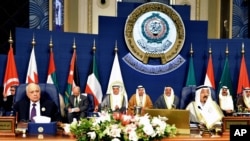The Arab League is holding its annual summit this week in Egypt's Red Sea resort of Sharm el-Sheikh, with Pan Arab national security topping the agenda.
Arab League Secretary General Nabil al-Arabi said the main topic of the summit will be maintaining national security in Arab countries.
The threat from the Islamic State (IS) jihadist group, the war in Syria, and the crises in Libya and Yemen are also expected to be discussed according to Ambassador Hany Khallaf, former Egyptian Ambassador to the Arab League, who spoke to VOA's Senior Middle East reporter Mohamed Elshinnawi earlier this week.
VOA: Mr. Ambassador, the Arab League Summit in Egypt comes at a time of so many challenges facing the Arab countries at large, what are the major topics that will be discussed at the summit?
Ambassador Khallaf: The summit will deal with crucial issues related mainly to Pan Arab national security including the possible adoption of an overall multifaceted strategy on combatting terrorism. This strategy will include short, medium and long-term actions in the fields of security, intelligence, and military alongside with elements related to religious education, culture, economic development and administration of justice.
Most of the Arab League members are in favor of establishing a joint Arab force to respond to threats facing the Arab national security.
Topping the summit agenda also is the situation in Yemen, Libya, Syria and Iraq. The summit will also assess the prospects and challenges facing the troubled Palestinian –Israeli peace talks sponsored by the U.S.
As for economics, the summit will discuss the possible conclusion of an Arab customs union which would lead to the realization of an Arab common market.
Yemen became a priority as Houthis were advancing toward the South threatening any peaceful settlement to the crisis, how would the Saudi military response impact the future of Yemen?
Ambassador Khallaf: The Saudi-led military action is not meant to completely intervene in the overall political process in Yemen but rather to empower the legitimate government of Yemen as the military balance became in favor of the Houthi movement and forces loyal to former president of Yemen Saleh. So the military campaign could hopefully help pushing forward the UN-sponsored talks to reach a peaceful political transition.
One major item on the Summit's agenda is discussing the formation of a joint Arab force to tackle the terrorist threats in the region, would the Arab coalition against Houthis be the first step?
Ambassador Khallaf: The proposal put forward by the Egyptian government to the Arab Summit aims at establishing a permanent mechanism to serve as a rapid response force, peacekeeping force but the Saudi-led operation is meant to deal only with the imbalance in power shown so far between the legitimate government and Houthi rebels supported by Saleh’s loyalists.
How urgent is finding an Arab supported settlement to the Libyan crisis?
Ambassador Khallaf: Settling the Libyan crisis will need a long time. It is a multifaceted problem that would require political arrangements, economic development projects and solving the problem of legitimacy. There is an urgent need to unify the forces that support a political solution to the Libyan crisis.
However there are daunting challenges the Summit would have to tackle related to terrorist threats to security of the Libyan borders with Egypt, Tunisia and Algeria.
What difference could the Arab Summit make in dealing with the challenge of the so called Islamic State in Syria and Iraq?
Ambassador Khallaf: My personal opinion is there must be some kind of modification to the Arab attitude toward the existing government in Syria to be able to handle the Islamic State threat. Syria’s ruler is still in power administering very shroud and severe tactics and politics. He can’t be ignored and any solution would have to include representatives of the Syrian government. That is why I think one of the major steps that the Arab Summit could take is to open the gate to use the sovereign power in Damascus as a part of the solution not only as a part of the problem. That could help realigning forces against the penetration of the so-called Islamic State into both Syria and Iraq.




